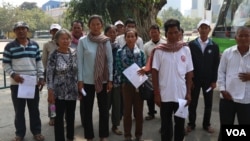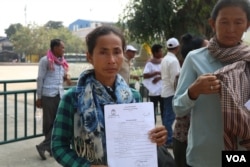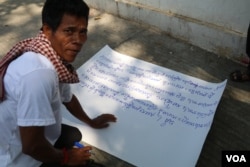A villager in Kampong Speu province was questioned on Thursday at the provincial court and later detained over his part in a long-running land dispute.
Y Sovann, 45, was accused of intentionally causing criminal damage, which is punishable by up to five years in prison.
Sovann’s unexpected detention caused anger among his fellow villagers, who traveled to Phnom Penh to seek intervention from Prime Minister Hun Sen.
Thy Sokha, Sovann’s wife, said she had lived on the site since 1999.
The Khmer Rouge regime ended private ownership of land in Cambodia from 1975 to 1979. When the regime fell in 1979, most Cambodians were living in rural communities and did not immediately worry about gaining formal land titles. But as time passed, the need for a formal land tenure system became increasingly urgent.
Land disputes have been one of the most contentious social problems in Cambodia over the past two decades. Widespread dispossession has made a serious dent in support for Hun Sen’s government, which became known in the mid-2000s for its policy of generating income by awarding large tracts of land to wealthy and well-connected investors.
In an interview in September 2015 with American filmmaker Robert H. Lieberman, Hun Sen spoke candidly about his “mistakes” in handling land reform, which he called the “biggest regret” of his career. He said his government had not done a good enough job of issuing land titles in a timely manner, and that this work should have begun in the 1980s.
Sokha said the land dispute began in 2005 after a violent eviction was attempted. Villagers vacated the land before returning in 2012.
“It was a bit silent,” Sokha said of the authority’s response to their return until the court recently summonsed the couple. “I thought the case was finished already,” she said. Sokha will be questioned on January 24.
Sokha’s husband was a policeman in the district and has just retired, she said. She currently depends on her husband’s pension, which is about $300 per month.
Nine people, including Sovann, were summonsed and now they are afraid of being arrested, according to villagers.
“The court is unfair,” said another villager, Mok Pros, 39, who claims ownership of about 7,000 square meters of land. “We want Samdech Hun Sen to help us,” he added.
The root causes of the dispute are unclear, but another villager, Mak Chem, who will be questioned by the court on January 23, said that the case is related to a “powerful person” who works in the military.
“Don’t let the powerful and the rich violate people whose land has houses and crops already,” said 67-year-old Chem, whose foot remains injured since the 2005 eviction, in which officials shot at the residents.
“They will arrest me if there is no immediate intervention from Samdech Hun Sen,” he added.
Local authorities tried to negotiate with villagers for some compensation, but villagers rejected their approaches, according to Chem.
Villagers claimed the disputed land is owned by Bou Sokim, the deputy secretary general at the Ministry of National Defense, who could not be reached for comment. The claim was confirmed by the provincial governor.
But the villagers said the complainants in the court case are three unknown people: Deung Minh, Rean Samreth and Meng Khun.
“I don’t know the people who sued me,” said Chem.
Kampong Speu Provincial Court spokesmen Ou Phat could not be reached for comment.
Vy Samang, Kampong Speu governor, said the villagers had been living illegally on Sokim’s land for a long time.
“[You] want me to shoot them to death? We need the judicial system,” he said.
The governor said the land belonged to Sokim, but said the official may have sold the land to other people.
“He bought the land from other soldiers who were given the land,” he said.
However, villagers said they can’t trust provincial authorities anymore.
“They have their own networks. Only they benefit from that,” said Chem.









